#Community Resource
Text
a list of 100+ buildings to put in your fantasy town
academy
adventurer's guild
alchemist
apiary
apothecary
aquarium
armory
art gallery
bakery
bank
barber
barracks
bathhouse
blacksmith
boathouse
book store
bookbinder
botanical garden
brothel
butcher
carpenter
cartographer
casino
castle
cobbler
coffee shop
council chamber
court house
crypt for the noble family
dentist
distillery
docks
dovecot
dyer
embassy
farmer's market
fighting pit
fishmonger
fortune teller
gallows
gatehouse
general store
graveyard
greenhouses
guard post
guildhall
gymnasium
haberdashery
haunted house
hedge maze
herbalist
hospice
hospital
house for sale
inn
jail
jeweller
kindergarten
leatherworker
library
locksmith
mail courier
manor house
market
mayor's house
monastery
morgue
museum
music shop
observatory
orchard
orphanage
outhouse
paper maker
pawnshop
pet shop
potion shop
potter
printmaker
quest board
residence
restricted zone
sawmill
school
scribe
sewer entrance
sheriff's office
shrine
silversmith
spa
speakeasy
spice merchant
sports stadium
stables
street market
tailor
tannery
tavern
tax collector
tea house
temple
textile shop
theatre
thieves guild
thrift store
tinker's workshop
town crier post
town square
townhall
toy store
trinket shop
warehouse
watchtower
water mill
weaver
well
windmill
wishing well
wizard tower
#worldbuilding#setting prompts#writer resources#writing inspiration#writing prompts#scene settings#writing reference#writing ideas#prompt list#creative writing#writing community#writer prompts#writing tips#world#fantasy world#fantasy worldbuilding#high fantasy#world building#epic fantasy#writing fantasy
31K notes
·
View notes
Text
The symbolism of flowers
Flowers have a long history of symbolism that you can incorporate into your writing to give subtext.
Symbolism varies between cultures and customs, and these particular examples come from Victorian Era Britain. You'll find examples of this symbolism in many well-known novels of the era!
Amaryllis: Pride
Black-eyed Susan: Justice
Bluebell: Humility
Calla Lily: Beauty
Pink Camellia: Longing
Carnations: Female love
Yellow Carnation: Rejection
Clematis: Mental beauty
Columbine: Foolishness
Cyclamen: Resignation
Daffodil: Unrivalled love
Daisy: Innocence, loyalty
Forget-me-not: True love
Gardenia: Secret love
Geranium: Folly, stupidity
Gladiolus: Integrity, strength
Hibiscus: Delicate beauty
Honeysuckle: Bonds of love
Blue Hyacinth: Constancy
Hydrangea: Frigid, heartless
Iris: Faith, trust, wisdom
White Jasmine: Amiability
Lavender: Distrust
Lilac: Joy of youth
White Lily: Purity
Orange Lily: Hatred
Tiger Lily: Wealth, pride
Lily-of-the-valley: Sweetness, humility
Lotus: Enlightenment, rebirth
Magnolia: Nobility
Marigold: Grief, jealousy
Morning Glory: Affection
Nasturtium: Patriotism, conquest
Pansy: Thoughtfulness
Peony: Bashfulness, shame
Poppy: Consolation
Red Rose: Love
Yellow Rose: Jealously, infidelity
Snapdragon: Deception, grace
Sunflower: Adoration
Sweet Willian: Gallantry
Red Tulip: Passion
Violet: Watchfulness, modesty
Yarrow: Everlasting love
Zinnia: Absent, affection
#writers#creative writing#writing community#writing#writers of tumblr#writing inspiration#creative writers#writeblr#writerblr#writing tips#flower symbolism#writing subtext#writblr#writers corner#how to write subtext#symbolism in writing#writing advice#creative writing tips#writing resources#writing help#writer tips#writing tips and tricks#helping writers#help for writers#references for writers#writing reference#writers block#beat writers block#novel writing
52K notes
·
View notes
Text
WAYS TO SUPPORT GAZA:
Care for Gaza is a legitimate non-profit, non-governmental charity currently supplying aid to Palestinians by creating food packages and giving cash to civilians in need. We are not affiliated with them, but want to share their tremendous work in aiding Palestinians in Gaza right now:
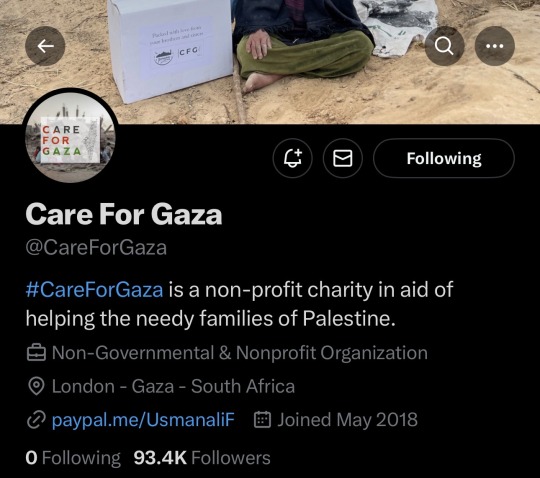
A direct link to their X acount:
https://x.com/careforgaza?s=21
GOFUNDME:
You can find their godundme linked here, which details what their charity does for Palestinians in need, how the process works and evidence of their donations—
Please reblog and help Palestinians who need it today!
#palestine#where to help#charity#mutual aid#palestine resources#aid for palestine#jewish antizionists#community support#please reblog#boost
16K notes
·
View notes
Text
So at my workplace, we fund a Food Is Free shelf. It's the basics: take what you need, give what you can - our town has a high level of poverty, there's a cost of living crisis, be the good you want to see in the world etc etc.
Today we had a guy knock on the door and ask if we had a plastic bag he could use to carry a few things - I said sure, got him a plastic bag, and he started packing up his 2 rolls of toilet paper, his 3 or 4 foodstuff items. He said he'd been to a funeral out of town (1500 kms away) and spent his paycheck on fuel - he was only broke till Friday, he said.
And I said, well I'm glad we could help, it's why we have the shelf. We want the community to use it.
And he said:
But people ABUSE it! I've seen people take heaps of stuff from it - and they don't even have kids or anything. And it's fair enough, some people are struggling until the next paycheck, but other people just ABUSE it. You need a sign that says TAKE ONE ITEM ONLY or something. I've taken something from here maybe twice, but I've seen people coming round every week! I've even put stuff on the shelf! Yeah, you need CAMERAS or something. People abuse it.
So here is a man who is actively utilising a public resource that we created to support our local community...And yet he is so brainwashed by capitalism into thinking that people don't deserve basic needs - if they're not working hard, or maybe they're struggling but they don't have it As Bad as others, or they're using a FREE RESOURCE more often than HE thinks is acceptable. He thinks that we should use security cameras to crack down on people "STEALING" from the Food is FREE shelf. Like he's more worthy, like he's a better person, because he doesn't need as much help as others might.
Sometimes, when something is free, people might abuse it. But isn't it better to offer the support to people who need it? To offer an opportunity for people to get back on their feet (even if they're only broke till Friday)? To provide help, no questions asked and no conditions needed?
So what if people abuse it - isn't it worth it if helps someone?
#capitalism can die in a hole#people are fundamentally good and all they need to do is the basic resources they need to survive#still cannot get over the fact that we need CAMERAS to stop people from *checks notes* using a food pantry for its intended purpose?#anticapitalism#solarpunk#mutual aid#community aid#community networks#food is free#food pantries
22K notes
·
View notes
Text
HEY YOU!
Yeah, you! Are you trans? Do you like reading books? Or watching movies?
Do you like media about trans men/transmasculine characters but don't know where to find it?
That's sooo crazy because I have this little spreadsheet I'm working on where I'm trying to document all media with protagonists/major characters who are FTM or transmasculine.
The spreadsheet currently has 300+ entries spread across the following categories:
Books
Manga
Memoirs and non-fiction
Movies
TV Shows
Graphic novels / Comics
Webcomics
Audio dramas
Books and movies are also sorted by:
Which character is trans (MC, love interest, antagonist, etc)
If the trans character is POC
The trans character's sexuality (Because I saw lots of transhet guys sad about only being able to find gay romances)
If the author/actor is also trans (if we know for sure)
It's free to use, and free to add to as well! Editing permissions are on, and I check on the spreadsheet every now and then to make sure everything is in order and to clean up.
If you know something that isn't on the list, please add it! You don't have to fill in every single column, but fill it to the best of your abilities.
If you don't want to use the big ass long link below, you can also use: bit.ly/FTM-protags
I made this because I want it to be a community resource. So even if you're not a trans guy or transmasculine person, please reblog!
#my gay little thoughts#ftm#trans#transgender#transmasc#transmasculine#trans community#trans writing#trans art#lgbt#lgbtq#trans books#trans movies#lgbt literature#trans literature#trans media#trans resources#trans representation#nonbinary#queer#ftm spreadsheet
7K notes
·
View notes
Text
HOW TO GIVE PERSONALITY TO A CHARACTER
Giving personality to a character is an essential part of character development in storytelling, whether you're writing a novel, screenplay, or creating a character for a role-playing game. Here are some steps and considerations to help you give personality to your character:
Understand Their Backstory:
Start by creating a detailed backstory for your character. Where were they born? What were their childhood experiences like? What significant events have shaped their life? Understanding their past can help you determine their motivations, fears, and desires.
2. Define Their Goals and Motivations:
Characters often become more interesting when they have clear goals and motivations. What does your character want? It could be something tangible like a job or a romantic relationship, or it could be an abstract desire like happiness or freedom.
3. Determine Their Strengths and Weaknesses:
No one is perfect, and characters should reflect this. Identify your character's strengths and weaknesses. This can include physical abilities, intellectual skills, and personality traits. Flaws can make characters relatable and three-dimensional.
4. Consider Their Personality Traits:
Think about your character's personality traits. Are they introverted or extroverted? Shy or outgoing? Kind or selfish? Create a list of traits that describe their character. You can use personality frameworks like the Myers-Briggs Type Indicator or the Big Five Personality Traits as a starting point.
5. Give Them Quirks and Habits:
Quirks and habits can make a character memorable. Do they have a specific way of speaking, a unique fashion style, or an unusual hobby? These details can help bring your character to life.
6. Explore Their Relationships:
Characters don't exist in isolation. Consider how your character interacts with others. What are their relationships like with family, friends, and enemies? These relationships can reveal a lot about their personality.
7. Show, Don't Tell:
Instead of explicitly telling the audience about your character's personality, show it through their actions, dialogue, and decisions. Let the reader or viewer infer their traits based on their behavior.
8. Create Internal Conflict:
Characters with internal conflicts are often more engaging. What inner struggles does your character face? These can be related to their goals, values, or past experiences.
9. Use Character Arcs:
Consider how your character will change or grow throughout the story. Character development is often about how a character evolves in response to the events and challenges they face.
10. Seek Inspiration:
Draw inspiration from real people, other fictional characters, or even historical figures. Study how people with similar traits and backgrounds behave to inform your character's actions and reactions.
11. Write Dialogue and Inner Monologues:
Writing dialogue and inner monologues from your character's perspective can help you get inside their head and understand their thought processes and emotions.
12. Consider the Setting:
The setting of your story can influence your character's personality. For example, a character who grows up in a war-torn environment may have a different personality than one raised in a peaceful, affluent society.
13. Revise and Refine:
Don't be afraid to revise and refine your character as you write and develop your story. Characters can evolve and change as the narrative unfolds.
Remember that well-developed characters are dynamic and multi-faceted. They should feel like real people with strengths, weaknesses, and complexities. As you write and develop your character, put yourself in their shoes and think about how they would react to various situations. This will help you create a compelling and believable personality for your character.
#writeblr#writing advice#creative writing#writerscommunity#writer problems#writing resources#writing community#writers on tumblr#writers block#the writer struggle#writing tips#writers#uservolkova
12K notes
·
View notes
Note
how do you write a liar?
How to Write Liars Believably
Language
The motive of every goal is the make the lie seem plausible while taking blame off the speaker, so liars will often project what they say to a third party: "Katie said that..."
Referring to third parties as "they" rather than he or she
In the case of a deliberate lie prepped beforehand, there will be an overuse of specific names (rather than pronouns) as the speaker tries to get the details right.
Overuse of non-committal words like "something may have happened"
Masking or obscuring facts like "to the best of my knowledge" and “it is extremely unlikely," etc.
Avoiding answers to specific, pressing questions
Voice
There's isn't a set tone/speed/style of speaking, but your character's speech patten will differ from his normal one.
People tend to speak faster when they're nervous and are not used to lying.
Body Language
Covering their mouth
Constantly touching their nose
fidgeting, squirming or breaking eye contact
turning away, blinking faster, or clutching a comfort object like a cushion as they speak
nostril flaring, rapid shallow breathing or slow deep breaths, lip biting, contracting, sitting on your hands, or drumming your fingers.
Highly-trained liars have mastered the art of compensation by freezing their bodies and looking at you straight in the eye.
Trained liars can also be experts in the art of looking relaxed. They sit back, put their feet up on the table and hands behind their head.
For deliberate lies, the character may even carefully control his body language, as though his is actually putting on a show
The Four Types of Liars
Deceitful: those who lie to others about facts
2. Delusional: those who lie to themselves about facts
3. Duplicitious: those who lie to others about their values
Lying about values can be even more corrosive to relationships than lying about facts.
4. Demoralized: those who lie to themselves about their values
Additional Notes
Genuine smiles or laughs are hard to fake
Exaggerations of words (that would normally not be emphasized) or exaggerated body language
Many savvy detectives ask suspects to tell the story in reverse or non-linear fashion to expose a lie. They often ask unexpected, or seemingly irrelevant questions to throw suspects off track.
#writers block#writing#writers and poets#creative writing#writers on tumblr#creative writers#helping writers#let's write#poets and writers#writeblr#resources for writers#writers of tumblr#writers life#writers community#writerscommunity#writer things#writing practice#writing prompt#writing community#writing inspiration#writing advice#writing tips#on writing#writer#writing questions#writing quotes#writing problems#writing process#writing progress
5K notes
·
View notes
Text
USEFUL SITES FOR ROLEPLAYERS
Thought I'd make a list of some useful websites for those of us who enjoy roleplaying and what have you here on Tumblr and whatnot.
roleplay formatter: Made by the awesome @rpclefairy. I honestly can't recommend this one enough. Great for adding color, changing the font size, and the whole shebang with bold + italics + underline + strikethrough. 10/10 always use
fsymbols + emojipedia: These are both great for making your tags fancy and whatnot.
alt codes: This is genuinely great for teaching you how to make the symbols with your keyboard for everyday use so there's that. It's especially useful if you and/or your muses speak a second language so that's a bonus.
text color fader: *marge vc* I just think gradient effects on text is neat. *end marge vc*
list of colors (wikipedia): Has a list of an infinite number of colors and their hex codes. Very useful if I do say so, myself. But that's just me.
screencapped.net: Great for getting all sorts of screenshots for making icons, GFXs, promos, and whatnot.
fancaps.net: Also great for getting all sort of screencaps for making icons, GFXs, promos, and whatnot. My only complaint is that it's a little annoying to navigate so here's the proper links to movies, tv shows, and anime.
photopea: Great if you can't afford Photoshop and/or don't like using GIMP.
hakuneko: It's not so much a website as much as it is a program. You can download manga, comics, webtoons, doujinshi, etc. for making your icons, GFXs, promos, and whatnot. It's also just a great way to read stuff and catch up on everything.
Feel free to reblog and add more. <333
#roleplay resource#roleplay help#roleplay community#roleplay#roleplaying#rpc#rpc help#rp help#rp resources#rp resource#roleplay resources#rp
3K notes
·
View notes
Text
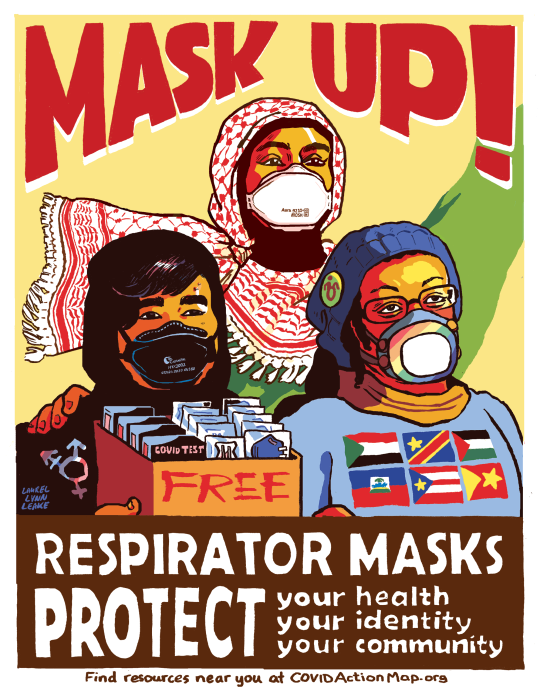
MASK UP FOR GLOBAL LIBERATION
Protect your community by wearing N95s and KN95s when meeting indoors or in crowds! The more of us mask up, the less we get sick, the harder it is for police to surveil us, and the safer we make our shared spaces for our disabled and immuno-compromised comrades and loved ones.
Get started by finding local mask resources on the global COVID Action Map (you can also submit groups to be added). If you have the means, donate masks and tests to your local orgs and encourage accessibility so we can ALL join the fight (bringing in interpreters/translators and medics, ensuring accessibility for wheelchairs/mobility devices, offering child care, filtering the air indoors, setting up virtual options etc).
UPDATE: Download this 8.5"x11" poster for free on itch.io to print and distribute! Includes files suitable for color, black and white, and risograph printing. Any donations will go to printing costs, or buying masks for my local mutual aid groups.
Pandemics have no borders, and all our struggles are united!
#covid 19#covid isn't over#free palestine#free sudan#free haiti#free the congo#free tigray#free puerto rico#global liberation#community care#covid cautious#protest resources#illustration
5K notes
·
View notes
Text
I’m actually serious about this, if at all possible, right now is a very good time to request queer books from your local library. Whether they get them or not is not in your control, but it is so important to show that there is a desire for queer books. I will also say getting more queer books in libraries and supporting queer authors are pretty fantastic byproducts of any action.
This isn’t something everyone can do, but please do see if you are one of the people who has the privilege to engage in this form of activism, and if you are, leverage that privilege for all you’re worth.
For anyone who can’t think of a queer book to request, here is a little list of some queer books that I think are underrated and might not be in circulation even at larger libraries:
Refusing Compulsory Sexuality: A Black Asexual Lens on Our Sex-Obsessed Culture by Sherronda J. Brown
Silver Under Nightfall by Rin Chupeco
Harvard's Secret Court: The Savage 1920 Purge of Campus Homosexuals by William Wright
The Perks of Loving a Wallflower by Erica Ridley
God Themselves by Jae Nichelle
IRL by Tommy Pico
The Pink Line: Journeys Across the World's Queer Frontiers by Mark Gevisser
Passing Strange by Ellen Klages
The New Queer Conscience by Adam Eli
Fierce Femmes and Notorious Liars: A Dangerous Trans Girl's Confabulous Memoir by Kai Cheng Thom
Queering the Tarot by Cassandra Snow
Wash Day Diaries by Jamila Rowser
Queer Magic: Lgbt+ Spirituality and Culture from Around the World by Tomás Prower
Before We Were Trans: A New History of Gender by Kit Heyam
Beyond the Pale by Elana Dykewomon
Hi Honey, I'm Homo! by Matt Baume
The Deep by Rivers Solomon
Homie: Poems by Danez Smith
The Secret Life of Church Ladies by Deesha Philyaw
The Companion by E.E. Ottoman
Kapaemahu by Dean Hamer, Joe Wilson, Hinaleimoana Wong-Kalu
Sacrament of Bodies by Romeo Oriogun
Witching Moon by Poppy Woods
Tell Me I'm Worthless by Alison Rumfitt
Dead Collections by Isaac Fellman
Disintegrate/Dissociate by Arielle Twist
Dear Senthuran: A Black Spirit Memoir by Akwaeke Emezi
Peaches and Honey by Imogen Markwell-Tweed
Nepantla: An Anthology Dedicated to Queer Poets of Color by Christopher Soto
#queer books#queer history#lgbt history#honestly#libraries are a massive resource in terms of preserving and uplifting marginalized narratives#and as a community#that has been so very excluded from both fictional and nonfictional narratives#this is a great way to reclaim and care for the stories that have been surpressed for so long
11K notes
·
View notes
Text
Words to use instead of ‘said’
**Using the word ‘said’ is absolutely not a bad choice, and in fact, you will want to use it for at least 40% of all your dialogue tags. Using other words can be great, especially for description and showing emotion, but used in excess can take away or distract from the story.
Neutral: acknowledged, added, affirmed, agreed, announced, answered, appealed, articulated, attested, began, bemused, boasted, called, chimed in, claimed, clarified, commented, conceded, confided, confirmed, contended, continued, corrected, decided, declared, deflected, demurred, disclosed, disputed, emphasized, explained, expressed, finished, gloated, greeted, hinted, imitated, imparted, implied, informed, interjected, insinuated, insisted, instructed, lectured, maintained, mouthed, mused, noted, observed, offered, put forth, reassured, recited, remarked, repeated, requested, replied, revealed, shared, spoke up, stated, suggested, uttered, voiced, volunteered, vowed, went on
Persuasive: advised, appealed, asserted, assured, begged, cajoled, claimed, convinced, directed, encouraged, implored, insisted, pleaded, pressed, probed, prodded, prompted, stressed, suggested, urged
Continuously: babbled, chattered, jabbered, rambled, rattled on
Quietly: admitted, breathed, confessed, croaked, crooned, grumbled, hissed, mumbled, murmured, muttered, purred, sighed, whispered
Loudly: bellowed, blurted, boomed, cried, hollered, howled, piped, roared, screamed, screeched, shouted, shrieked, squawked, thundered, wailed, yelled, yelped
Happily/Lovingly: admired, beamed, cackled, cheered, chirped, comforted, consoled, cooed, empathized, flirted, gushed, hummed, invited, praised, proclaimed, professed, reassured, soothed, squealed, whooped
Humour: bantered, chuckled, giggled, guffawed, jested, joked, joshed
Sad: bawled, begged, bemoaned, blubbered, grieved, lamented, mewled, mourned, pleaded, sniffled, sniveled, sobbed, wailed, wept, whimpered
Frustrated: argued, bickered, chastised, complained, exasperated, groaned, huffed, protested, whinged
Anger: accused, bristled, criticized, condemned, cursed, demanded, denounced, erupted, fumed, growled, lied, nagged, ordered, provoked, raged, ranted remonstrated, retorted, scoffed, scolded, scowled, seethed, shot, snapped, snarled, sneered, spat, stormed, swore, taunted, threatened, warned
Disgust: cringed, gagged, groused, griped, grunted, mocked, rasped, sniffed, snorted
Fear: cautioned, faltered, fretted, gasped, quaked, quavered, shuddered, stammered, stuttered, trembled, warned, whimpered, whined
Excited: beamed, cheered, cried out, crowed, exclaimed, gushed, rejoiced, sang, trumpeted
Surprised: blurted, exclaimed, gasped, marveled, sputtered, yelped
Provoked: bragged, dared, gibed, goaded, insulted, jeered, lied, mimicked, nagged, pestered, provoked, quipped, ribbed, ridiculed, sassed, teased
Uncertainty/Questionned: asked, challenged, coaxed, concluded, countered, debated, doubted, entreated, guessed, hesitated, hinted, implored, inquired, objected, persuaded, petitioned, pleaded, pondered, pressed, probed, proposed, queried, questioned, quizzed, reasoned, reiterated, reported, requested, speculated, supposed, surmised, testified, theorized, verified, wondered
This is by no means a full list, but should be more than enough to get you started!
Any more words you favor? Add them in the comments!
Happy Writing :)
#writing resources#writing advice#creative writing#writers on tumblr#tumblr writers#dialogue#writing dialogue#dialogue tags#instead of said#writing community#writer#writeblr#writerscommunity#novel writing#writing#fiction
13K notes
·
View notes
Text
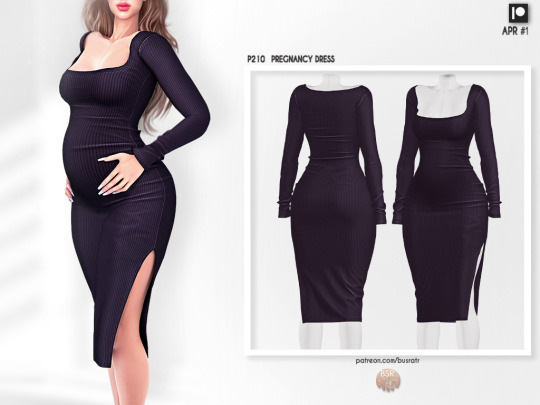
PREGNANCY DRESS P210 (APR #1)
20 Opitons
_________
Adult-Elder-Teen-Young Adult
For Female
————–
Compatible with HQ mod-
New Mesh
All Lods
Custom thumbnail
Early Access ( Avaible 20.07.2024)
Includes Blend File as option
**-Please do not re upload or claim as yours feel free to re color but do not include the mesh .

DOWNLOAD PATREON
I hope you like them. ♥
💖 You can check out my Patreon for special cc and other early access content. 💖
#the sims 4#the sims 4 custom content#the sims 4 custom content finds#busra-tr#ts4 cc finds#ts4#the sims resource#ts4 cc download#the sims#ts4 cc free#the sims 4 cc#the sims 4 screenshots#the sims 4 cas#the sims 4 download#sims 4#ts4 simblr#ts4 screenshots#my sims#ts4 gameplay#ts4 legacy#ts4cc#the sims community#patreon#ea#3d#3d mesh#the sims 4 hq#simblr#simstagram#the sims story
3K notes
·
View notes
Text
How to Write Betrayal
Betrayal is a powerful plot element that is represented in countless stories. The gravity of betrayal brings a profound depth to character dynamics, plots, and themes alike, making it an indispensable tool for writers to explore emotions, conflicts, and the complexities of human nature. Let’s explore some quick tips on how to write betrayal!
Behaviour
Secretive actions
Dishonesty
Becoming emotionally distant
A sudden change in routine
Pushing people away
Nervous or fidgety movement
Frequent lying or making up stories
Unexpected aggression or irritability
Unjustified mood swings or emotional outbursts
Increasingly defensive
Interactions
Disturbed interpersonal relationships
Frequent misunderstandings or fights
Withholding information
Avoiding personal discussions
Insincerity in conversations
Frequently cancelling or missing plans
A sudden shift in relationship dynamics
Quick to deflect or place blame
Frequent subject changes
Gradual emotional detachment
Body Language
Avoiding direct eye contact
Defensive stance and crossed arms
Covering mouth or touching face
Shuffling or restless movements
Forcing smiles or laughter
Constantly looking around or at the ground
Stiff, tense posture
Heavy breathing or frequent sighing
Avoiding touch or skin contact
Exaggerated gestures
Attitude
A lack of concern or empathy
Increasingly personal and hurtful arguments
Erratic or unpredictable reactions
Self-centeredness
Insincerity
Dismissive or negative attitude
Callous disregard for other's feelings
A negative or pessimistic outlook
Inability to handle criticism
Withdrawal from relationships
Positive Story Outcomes
In the wake of a betrayal, a story can manifest various positive outcomes that add depth to the plot and its characters. Relationships can be strengthened, showing their resilience. Characters may discover newfound self-reliance and learn valuable lessons about trust and forgiveness, leading to an increase in empathy and understanding, personal growth, and the reinforcement of personal values. These experiences can encourage a clearer understanding of personal boundaries, prompt self-reflection, introspection, and the development of healthier coping mechanisms. Ultimately, these positive outcomes can bring about improved communication and honesty, forming the silver lining in the cloud of betrayal.
Negative Story Outcomes
The aftershocks of betrayal can reverberate throughout your story. This might include an irreparable fracture of trust and damage to relationships. Betrayal can trigger psychological trauma, leading to an increase in suspicion and insecurity. Feelings of inadequacy or self-blame may surface, and characters can experience a heightened sense of isolation. The fear of forming new relationships or trusting others can become overwhelming. There may also be an escalation of conflict or violence and the reinforcement of negative behaviours or patterns. Damaged self-esteem or self-worth may be another repercussion, and this can encourage destructive coping mechanisms.
Helpful Synonyms
Treachery
Deception
Double-crossing
Duplicity
Backstabbing
Two-faced
Disloyalty
Unfaithfulness
Infidelity
Falseness
Perfidy
Treason
Fraud
Deceit
Slander
Misrepresentation
Falsification
Chicanery
Double-dealing
#writers#creative writing#writing#writing community#writers of tumblr#creative writers#writeblr#writerblr#writing inspiration#writing tips#writblr#writers corner#writing quick tips#quick writing tips#writing resources#writing advice#writer#on writing#writers block#beat writers block#let's write#writing betrayal#writing emotions#character development#writing characters#advice for authors#references for writers#helping writers#writing help#help for writers
6K notes
·
View notes
Text
What to give a fuck about,while writing your first draft!
I`ve posted a list about things you don´t need to give a fuck about while writing your first draft. Here are things you NEED TO CARE about! (in my opinion)
Your Authentic Voice: Don't let the fear of judgment or comparison stifle your unique voice. I know it´s hard,but try to write from your heart, and don't worry about perfection in the first draft. Let your authenticity shine through your words.
Your Story, Your Way: It's your narrative, your world, and your characters. Don't let external expectations or trends dictate how your story should unfold. Write the story you want to tell.
Progress Over Perfection: Your first draft is not the final product; it's the raw material for your masterpiece. Give a fuck about making progress, not achieving perfection. Embrace imperfections and understand that editing comes later.
Consistency and Routine: Discipline matters. Make a commitment to your writing routine and stick to it.
Feedback and Growth: While it's essential to protect your creative space during the first draft, be open to constructive feedback later on. Giving a f*ck about growth means you're willing to learn from others and improve your work.
Self-Compassion: Mistakes, writer's block, and self-doubt are all part of the process. Give a f*ck about being kind to yourself. Don't beat yourself up if the words don't flow perfectly every time. Keep pushing forward and remember that writing is a journey.
Remember, the first draft is your canvas, your playground. Don't bog yourself down with unnecessary worries.

#writing#writblr#writing advice#writers block#just writer things#creative writing#fanfiction writing#writing motivation#writeblr#original writing#writing reference#writing tips#writers on tumblr#writing resources#writing tip#writing encouragement#writing community#writers#world building#point of view#editing#character creation#dialogue#mine.#words#writingtips#writingadvice
4K notes
·
View notes
Text
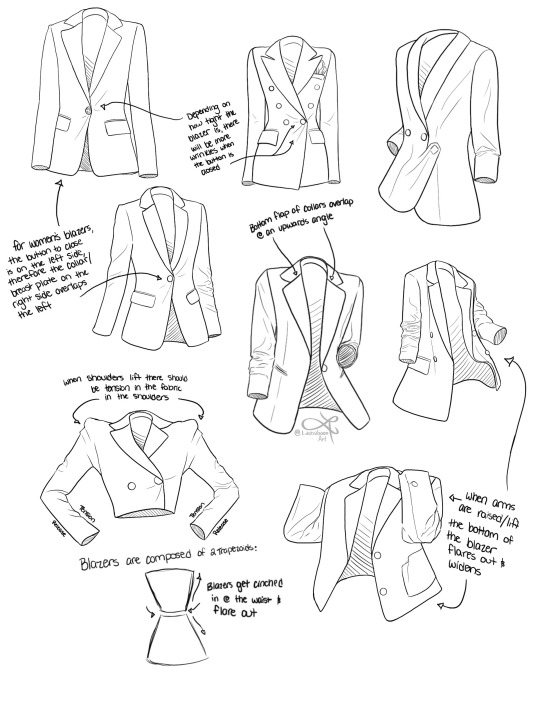
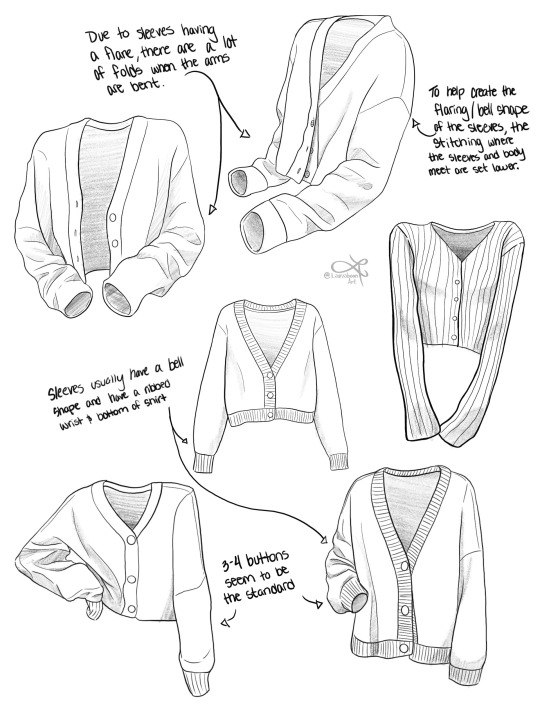
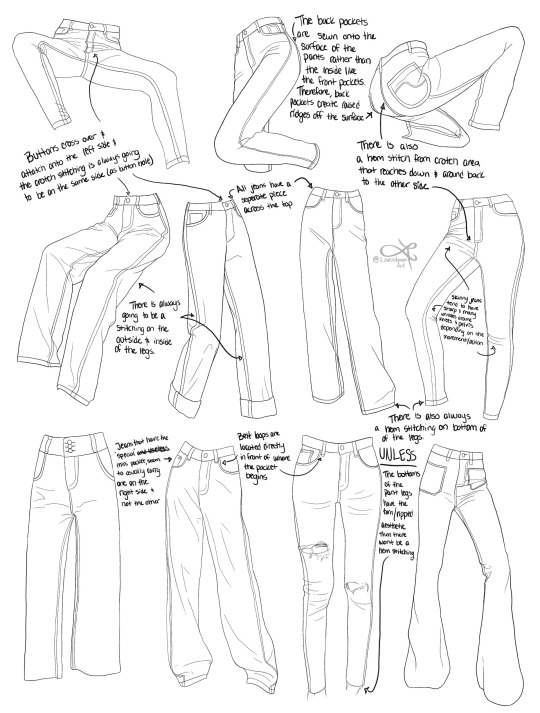
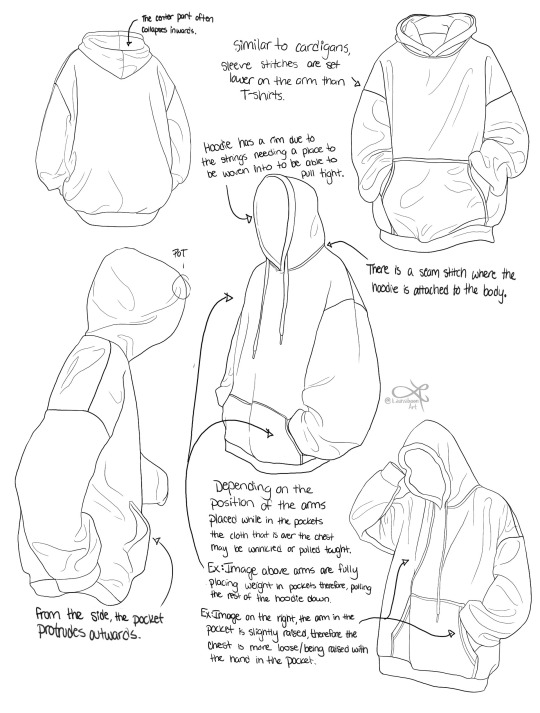
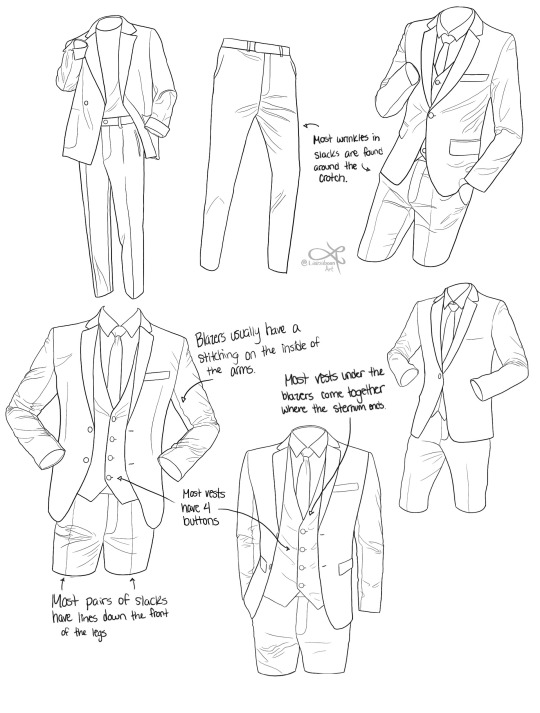
I'm currently doing an online art school program and I thought I'd share some notes on clothing pieces for anyone else whose like me and for some reason can't understand objects with free from lol I hope you find some of these observations/ notes useful for any of your art journeys!
#art reference#reference#art tutorial#art tips#art resources#art advice#drawing tips#drawing reference#clothing reference#how to draw clothes#drawing#how to draw#drawing tutorial#art education#art help#clothing#fashion drawing#art school#artists on tumblr#art community#art study
19K notes
·
View notes
Text
Ultimate "Know Your Character Inside Out" Template
The ultimate template for creating a character, without losing your mind, while you're at it.

Character Background Template ... (open)
1. Name:
2. Age:
3. Gender & Pronouns:
4. Physical Appearance:
- Hair color:
- Eye color:
- Height:
- Build:
- Distinguishing features (scars, tattoos, etc.):
5. Background and Upbringing:
- Where were they born and raised?
- What was their family structure like (parents, siblings)?
- Describe their childhood environment and upbringing.
- Were there any significant events or traumas in their past?
6. Education and Skills:
- What level of education did they receive?
- Did they excel in any particular subjects or skills?
- Have they pursued any additional training or education since then?
7. Personality Traits:
- Describe their personality in a few words.
- What are their strengths and weaknesses?
- How do they typically react under stress or pressure?
8. Motivations and Goals:
- What are their short-term and long-term goals?
- What drives them to pursue these goals?
- Are there any fears or insecurities that motivate or hinder them?
9. Relationships:
- Who are the most important people in their life?
- How do they interact with family, friends, and acquaintances?
- Do they have any romantic interests or significant relationships?
10. Past Experiences:
- Have they faced any major challenges or setbacks in the past?
- How have these experiences shaped their beliefs and values?
- Have they experienced any significant losses or tragedies?
11. Worldview and Beliefs:
- What are their core beliefs and values?
- How do they view the world around them?
- Are there any cultural, religious, or philosophical influences in their life?
12. Inner Conflict:
- What internal struggles do they face?
- Are there any unresolved issues from their past that continue to affect them?
- How do these inner conflicts impact their decisions and actions?
13. Connection to Outer Conflict/Plot:
- How does their personal journey intersect with the main plot or external conflict?
- What stakes are involved for the character in the larger story?
- How do their goals and motivations align (or conflict) with the central conflict?
(Shorter) Knowing Your Character Inside Out Checklist
Personality Traits:
- Introverted/Extroverted
- Optimistic/Pessimistic
- Assertive/Passive
- Empathetic/Self-centered
- Logical/Emotional
- Adventurous/Cautious
- Honest/Dishonest
- Ambitious/Content
Beliefs and Values:
- Religious beliefs (if any)
- Moral code
- Political beliefs
- Views on relationships
- Attitude towards authority
Fears and Insecurities:
- Common fears (spiders, heights, etc.)
- Deep-seated insecurities (failure, rejection, etc.)
- Traumatic experiences (if applicable)
Desires and Goals:
- Short-term goals
- Long-term aspirations
- What motivates them to pursue these goals?
Strengths:
- Intellectual strengths
- Physical abilities
- Emotional resilience
- Social skills
- Unique talents or abilities
Weaknesses:
- Personal flaws
- Areas of vulnerability
- Bad habits
- Limiting beliefs
Backstory:
- Family background
- Childhood experiences
- Significant life events that shaped their identity
- Education and career path
- Previous relationships
-Josie
#writer community#writing#writing help#character template#original character#character creation#creative writing#writeblr#writerslife#writing community#writers on tumblr#writers of tumblr#writers#writing inspiration#writing prompt#writing prompts#writing tips#writing reference#character prompt#rp template#rp resources#writing advice#writing blog#on writing#writerscommunity#writing template#multiuse#creative process#character creation template#authors of tumblr
1K notes
·
View notes